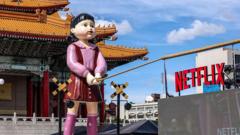In a dramatic turn of events, Bolivia is poised to elect its first non-left wing president in nearly twenty years, with Senator Rodrigo Paz Pereira emerging as the frontrunner in a first-round presidential election held recently. Preliminary results indicate that Paz Pereira, representing the Christian Democratic Party, and former president Jorge Quiroga secured the top two positions, although neither candidate achieved the necessary majority to win outright. This outcome will lead to a run-off election scheduled for October.
Bolivia's Historic Shift: Non-Left Wing Candidate Dominates Presidential Election

Bolivia's Historic Shift: Non-Left Wing Candidate Dominates Presidential Election
Bolivia prepares for a run-off election as Rodrigo Paz Pereira leads the first-round vote, marking a potential political shift after two decades of socialist rule.
Paz Pereira's unexpected rise to prominence in the polls — which had previously favored businessman Samuel Doria Medina — shows a significant desire for change among voters. His campaign centered around economic reforms, promising to redistribute resources from the central government to regional entities, combat corruption, and promote an inclusive economic system under the slogan "capitalism for all, not just a few." His proposed policies include increasing access to credit, offering tax incentives for businesses, and reducing import barriers for non-locally produced goods.
The run-off election signals a likely shift in Bolivia's foreign policy, which could lean more toward the United States after years of closer ties with nations like China, Russia, and Iran. This potential pivot comes amid a backdrop of severe economic crisis characterized by food shortages, high inflation, and a lack of foreign reserves. Voter sentiment has demonstrated a strong desire for political change, especially in light of the unpopularity of the current government led by the Movimiento al Socialismo (MAS) party.
Tensions on Election Day illustrated the dissatisfaction with the current regime, as supporters of the ruling party faced backlash from the electorate. Notably, MAS candidate Eduardo del Castillo was confronted by voters who expressed their frustrations, and an incident at a polling station involving the left-wing candidate Andrónico Rodríguez escalated to violence when an explosive device was detonated. Although damage was minimal, the incident highlighted the charged political atmosphere in Bolivia.
The election marks the first time in two decades that former president Evo Morales, who held power from 2006 to 2019 before being barred from running again, will not be on the ballot. He has remained a polarizing figure, urging his remaining supporters to nullify their votes. His departure from the political scene has left a significant void in the leadership of the MAS party, which is currently experiencing fragmentation and internal conflict following recent elections.
This electoral transition exemplifies the complexities and challenges faced by the MAS party, which is grappling not only with a damaged public image but also with deep-rooted divisions among its supporters. As the country heads toward a decisive run-off election, the political landscape in Bolivia is set for potential transformation amidst the clamor for reform and change.
The run-off election signals a likely shift in Bolivia's foreign policy, which could lean more toward the United States after years of closer ties with nations like China, Russia, and Iran. This potential pivot comes amid a backdrop of severe economic crisis characterized by food shortages, high inflation, and a lack of foreign reserves. Voter sentiment has demonstrated a strong desire for political change, especially in light of the unpopularity of the current government led by the Movimiento al Socialismo (MAS) party.
Tensions on Election Day illustrated the dissatisfaction with the current regime, as supporters of the ruling party faced backlash from the electorate. Notably, MAS candidate Eduardo del Castillo was confronted by voters who expressed their frustrations, and an incident at a polling station involving the left-wing candidate Andrónico Rodríguez escalated to violence when an explosive device was detonated. Although damage was minimal, the incident highlighted the charged political atmosphere in Bolivia.
The election marks the first time in two decades that former president Evo Morales, who held power from 2006 to 2019 before being barred from running again, will not be on the ballot. He has remained a polarizing figure, urging his remaining supporters to nullify their votes. His departure from the political scene has left a significant void in the leadership of the MAS party, which is currently experiencing fragmentation and internal conflict following recent elections.
This electoral transition exemplifies the complexities and challenges faced by the MAS party, which is grappling not only with a damaged public image but also with deep-rooted divisions among its supporters. As the country heads toward a decisive run-off election, the political landscape in Bolivia is set for potential transformation amidst the clamor for reform and change.

















